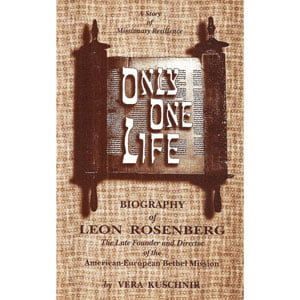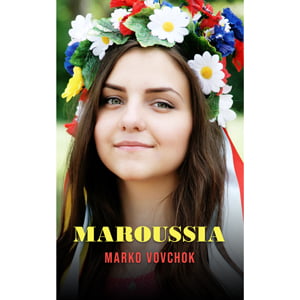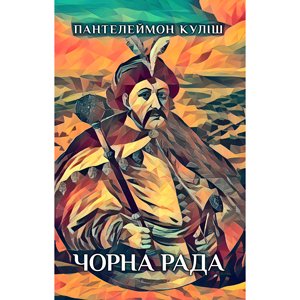
In the pages following this introduction, we gladly accede to the requests repeatedly made by our friends and co‑workers in the Lord’s vineyard, namely, that we should write and publish the life story of the Founder of the American European Bethel Mission, Leon Rosenberg.
The life story of this man is most unusual, if not actually unique. It represents personal experiences of a rabbinical student, who eventually became a veteran missionary of the Cross of Christ. It documents experiences which took place in two different “worlds” — the rabbinical “world” into which Leon Rosenberg was born and in which he spent his early years, being very strictly reared until he reached a mature age of twenty, and the Christian “world” in which he lived after his spiritual regeneration.
The latter part of the early years, until Leon reached his twentieth birthday and graduated from a rabbinical seminary, were spent mostly in the gloom of uncertainty, deep longings and inner conflicts due to his burning thirst for knowledge and his quest for THE TRUTH.
The depth of such a spiritual conflict is known only to those who have experienced it. The gap between Rabbinical Judaism on the one hand, and Biblical Christianity (which we might call “Messianism”) on the other, seemed to be insurmountable. The power of THE LAW, the rigid demands of the sages and their precepts, had already deeply influenced his life, while the Light of the “sure word of prophecy,” as given in the prophetic books, was hidden and the study thereof forbidden.
It is indeed a miracle when one manages to find his way out of the confusing labyrinth of rabbinical “interpretations” and “explanations” of the Holy Writ as contained in the books of the Talmud.
On the other hand, the sometimes shallow and dogmatic way of presenting the claims of Jesus Christ, as the promised and expected Messiah of Israel on the part of those who represented Christianity, served only to deepen the inner conflict of the one whose life story we are venturing to publish.
It behooves the biographer to acquaint the reader with some of the early struggles of the hero of this biographical sketch in his search for proofs, substantiating the Messiahship of Jesus of Nazareth, and especially His deity as the Son of the Living God. The frequently heated arguments with those who presented those claims, will serve as an eye‑opener to many, and introduce them to a type or kind of Jews who are Jews not only because they were born such, but are Jews by deliberate choice. (Rom. 12:28,29)
Rabbinical Talmudic Judaism is an entirely different world from that of Christendom. So are some of the customs and rites, as well as the significance, which this cast of Jews attaches even to their observance of the Sabbath and other festivals in their mystical aspects. All these facts will be displayed before the eyes of the reader in this unusual life story, and he or she will find it very enlightening and profitable. The arguments, used by young Rosenberg to defend his faith, and how he eventually overcame the obstacles and stumbling‑blocks in his path to becoming a Christian, will be of assistance to many who are interested in the salvation of Israel as a nation, and of individual Jews.
The acceptance of Christ as his personal Savior was really a triumph of the grace of God in Leon Rosenberg’s life, and a real proof that “the Gospel is the power of God unto salvation to every one that believeth, to the Jew first and also to the Greek.” (Rom. 1:16)
Although Leon Rosenberg’s struggle between “darkness” and “light” lasted for quite some time, praise God the final victory was the Lord’s, because Leon’s rabbinical zeal was reborn with him and was sanctified and yielded fully to “show forth the praises of Him Who had called him out of darkness into His marvelous light.” (1 Peter 2:9)
The two different “worlds,” mentioned earlier, had been packed with thrilling experiences which must be related in this biography as they are radically different from one another. The first “world” was the world of Leon’s early childhood and youth, which were spent in rabbinical training, in preparation to follow in the footsteps of his father.
The experiences of the second “world,” after Leon’s conversion, fall into several time spans, the first of which began in Czarist Russia, with its rigid laws prohibiting the spreading of the Gospel under Pobedonoszev, the Procurator of the Holy Synod of the official Russian Church, known as the Russian Orthodox Church.
The marvelous leading of the Lord of this missionary took him not only to glorious heights and outstanding blessings, but also into the depths of a Jewish “pogrom,” including banishment to Siberia.
The second time span of Leon’s Christian “world” was spent under the bloody Communist regime of Lenin with all of its horrors: starvation, imprisonment and even a death sentence.
The third time span was the time of Nazi cruelties, which cost the lives of Leon’s own daughter and her husband, along with many other relatives, of six assistants in his Mission, and of a great number of dear children of the “Bethel” Orphanage in Poland, who had to drink the bitter cup of affliction and death, together with millions of men, women and children of their kindred.
The fourth time span, and the most wonderful of all, was the one spent in the USA after the rebirth of the Bethel Mission there, and the establishment of the Jewish State in the land of Palestine. It was the best part of Leon’s Christian “world” with all the glorious experiences in the ministry of soul winning among many Jews in the USA and Israel. He repeatedly stated that the greatest lesson which God allowed him to learn through it all was that nothing in the world can separate us from the love of Christ. (Rom. 8:35)
Leon Rosenberg’s life was lived largely under the shadow of the Cross, and in many ways it can be likened unto that of the Apostle Paul, concerning whom the Lord said, “I will show him how much he must endure for My name’s sake.” Like Paul, Leon, too, learned to say, “We rejoice inasmuch as we are partakers of Christ’s suffering,” and that all sufferings for the sake of Christ “are not worthy to be compared with the glory which shall be revealed in us” (Rom. 8:18). He “banked” upon the promises “Who shall separate us from the life of Christ? Shall tribulation, or distress, or persecution, or famine, or nakedness, or peril, or sword? Nay, in all these things we are more than conquerors through Him that loved us. For I am persuaded that neither death, nor life, nor angels, nor principalities, nor powers, nor things present, nor things to come, nor height, nor depth, nor any other creature, shall be able to separate us from the love of God, which is in Christ Jesus our Lord.” (Rom. 8:35f.)
We are writing these pages with deep gratitude to God for His matchless Grace which has so gloriously enriched the life of this outstanding servant of His, and our prayer is that this story may be a blessing and a source of encouragement to all who read it.



